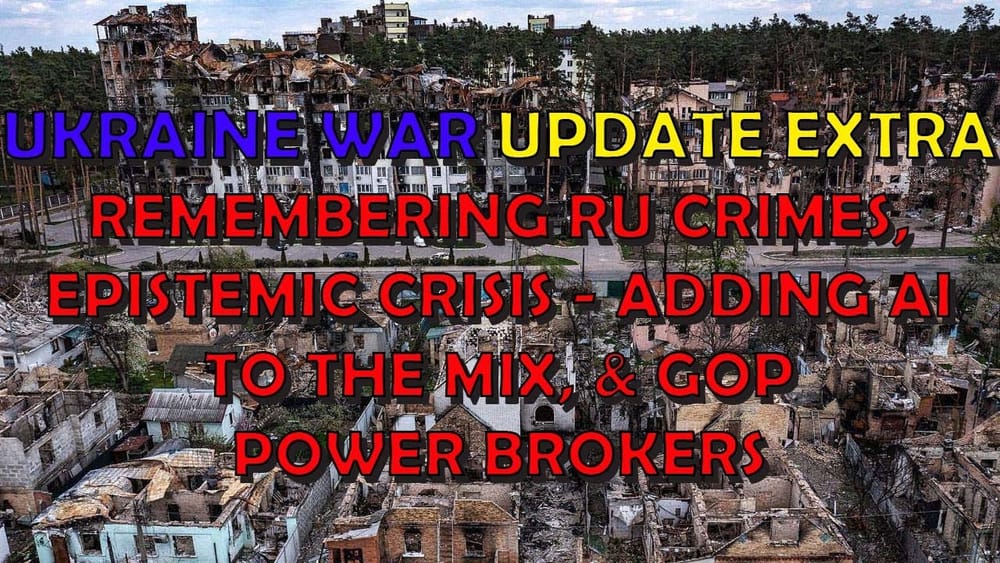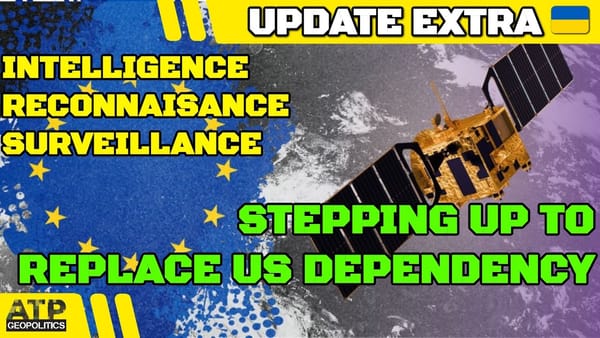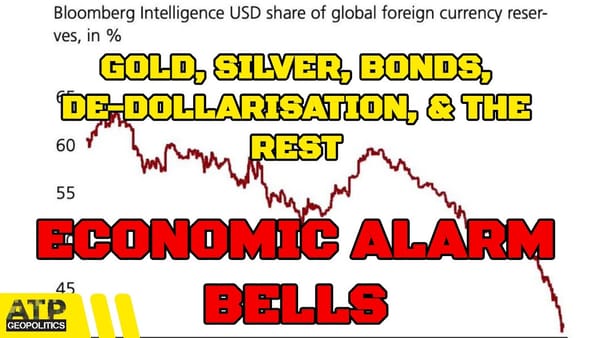Ukraine War Upd. EXTRA: Epistemic Crisis, Ru War Crimes, AI, GOP & Dems on Ukraine
Table of Contents 📖
“Trump is a troll. And like all trolls, he is never funny, and he never laughs. He only crows or jeers.”
Hello Team
🎦 00:00-00:29⏩
Jonathan welcomes viewers to another Ukraine War Update EXTRA video, a long time since he has done one of these as he is busy creating other content about the war. He plans to serialise an important essay from the Institute for the Study of War and will continue the discussion in the next video.
Return to top⤴️
The Military Industrial Complex
🎦 00:29-03:56⏩
Jonathan discusses a comment by the UK boss of Tal Tyler, a French military industrial concern. The UK boss says that Britons have a peculiar attitude to the military industrial complex, praising the armed forces while despising the industry that supplies them. Jonathan agrees with this view, finding it insightful as he finds people are often cynical about the military industrial complex even when they support the armed forces. He argues that the complex should be championed as it supports the economy and provides the armed forces with the best equipment, particularly in the context of the Ukraine war where Ukraine desperately needs the support of international arms manufacturers. He connects this to the paradox of intolerance, arguing that those who are tolerant of intolerance are more susceptible to being taken over by it. This means that you need to have a strong military to defend yourself and avoid being taken advantage of by hostile nations. Jonathan concludes that you need to back your own arms manufacturers and ensure responsible governance so that these weapons are not used for nefarious or dubious purposes. This is why democracy is so important.
Return to top⤴️
The Rise of Generative AI and the Epistemic Crisis
🎦 03:56-09:58⏩
Jonathan discusses the rapid development of Generative AI (GAI) and its potential impact on propaganda and disinformation. He highlights the concerning fact that GAI platforms can generate text, images, videos, and other data, often in response to prompts, which can be used to flood the internet with misinformation. He acknowledges that GAI can be used for good but also worries about its potential to be co-opted for nefarious ends. He uses examples like Midjourney, DAL-E, and ChatGPT to illustrate how quickly GAI platforms have advanced. He then discusses the implications for truth and the ongoing epistemic crisis, making it increasingly difficult to distinguish between real and fake content. This is a serious issue, particularly in the context of the Russia-Ukraine war, where GAI has been used to create anti-Ukrainian propaganda, deep fakes of Ukrainian leaders, and fake news articles. Jonathan highlights how GAI-generated content can easily spread misinformation and cause significant damage, highlighting the difficulty of undoing the damage once it has been done. He emphasises the need to be vigilant and cautious about the information we encounter online.
Return to top⤴️
War Crimes and the Failure of International Law
🎦 09:58-25:11⏩
Jonathan highlights the ongoing war crimes committed by Russia in Ukraine. He cites UNOHCHR figures on civilian deaths and injuries, which are likely much higher due to Russia's obstruction of access to occupied territories. He emphasises the importance of remembering the horrific events in Mariupol and the systematic use of mass graves by Russia. Jonathan explains how Russia is deliberately erasing Ukrainian history and culture by destroying schools and libraries and targeting young minds to force them to adopt Russian ideologies and propaganda. He further discusses the ecological damage caused by Russia's attacks on agricultural seaports and infrastructure, which has far-reaching consequences for food security worldwide. In conclusion, Jonathan states that Russia's actions in Ukraine amount to an unprecedented level of war crimes, violating multiple provisions of the Geneva Conventions. He highlights specific examples of how Russia is violating international law regarding the protection of civilians, healthcare facilities, humanitarian workers, and first responders. He expresses concern that Russia's continuous violation of these laws without consequences sends the message that international law is nothing more than words on paper. This creates a dangerous precedent for other nations under dictatorships and predators to follow their own war paths, knowing that they will only face verbal condemnation.
Return to top⤴️
The Institute for the Study of War Essay: Russia's Strategy
🎦 25:11-32:03⏩
Jonathan discusses an essay from the Institute for the Study of War, highlighting the importance of understanding Russia's real strategy in the Ukraine war. The essay, written by Ilya Ponomarenko, argues that Russia's only hope of success is to get the West to abandon Ukraine. Russia is attempting to achieve this by spreading disinformation, promoting narratives like "peace equals surrender" and "resistance to Russian aggression equals escalation," and undermining Western support for Ukraine. Jonathan stresses the importance of Western leaders understanding this strategy and resisting the Kremlin's information operations. He states that Russia cannot win the military war but can win in the information space by getting the West to believe that Russia will prevail. Jonathan concludes that it is crucial to be aware of this strategy and to continue to support Ukraine.
Return to top⤴️
US Politics: Democrats vs. Republicans on Ukraine
🎦 32:03-49:31⏩
Jonathan explores the differing attitudes of Democrats and Republicans in the US towards the war in Ukraine. He argues that Democrats are more vocal in their support for Ukraine and are actively pushing for aid packages, while Republicans are more divided and have been influenced by Russian disinformation. He cites examples from US media, including Christiane Amanpour's interview with Jon Stewart and Eric Swalwell's interview on Midas Touch, to illustrate how the issue of Ukraine is constantly being discussed in US media and politics. He highlights the concerning role of Marjorie Taylor Greene, a Republican congresswoman, who is holding up Ukraine aid and leveraging her position for political gain. This has created a situation where the Republican party is becoming more and more like a Trump cult, making it difficult for those who disagree with Trumpism to find a home. Jonathan concludes that the situation is deeply worrying, as the Republican party's failure to support Ukraine is playing into the hands of the Kremlin and endangering Ukraine's survival.
Return to top⤴️
The Importance of Little Things
🎦 49:31-54:01⏩
Jonathan argues that focusing on seemingly insignificant details can reveal valuable insights into people's characters and motivations. He gives an example of a conversation between Donald Trump and some employees at a Chick-fil-A restaurant in Georgia. Trump's small talk revolves around the employees' wealth and business success, showing a lack of empathy and a focus on his own self-interest. He concludes that this interaction encapsulates Trump's personality, which Jonathan believes is all about getting rich and lacking compassion for others. This leads him to share an insightful and humorous excerpt from a British writer, Nate White, who penned the best description of Trump he has ever read.
Return to top⤴️
Nate White's Description of Trump
🎦 54:01-58:59⏩
Jonathan shares an excerpt from a British writer, Nate White, who provides a scathing but humorous critique of Donald Trump. White lists a series of qualities that Trump lacks, including class, charm, coolness, credibility, compassion, wit, warmth, wisdom, subtlety, sensitivity, self-awareness, humility, honour, and grace. White argues that Trump is a "fat white slug," a "jab of the heart of privilege," and a "bully." He also criticizes Trump's lack of humour and his habit of using crude insults and casual cruelty. In conclusion, White highlights Trump's fundamental lack of depth and inner world, comparing him to a "Picasso of pettiness" and a "Shakespeare of shit." He concludes by saying that Trump is the embodiment of being a "twat."
Return to top⤴️
Wrap up
🎦 58:59-01:00⏩
:30
Jonathan reminds viewers of the gravity of the situation in Ukraine, emphasizing that it is crucial to continue supporting Ukraine and holding Russia accountable for its crimes. He stresses the importance of reminding our governments of their duty to represent us, not their personal agendas, and to listen to the will of the people. He expresses concern over the influence of individuals like Marjorie Taylor Greene and Mike Johnson, who are pushing their agenda and causing harm to Ukraine. He finishes by saying that while it's unlikely that anything said or written on his platform will directly change the situation in Ukraine, he hopes that his content will at least serve as a reminder of the importance of supporting Ukraine and holding Russia accountable.
Return to top⤴️




